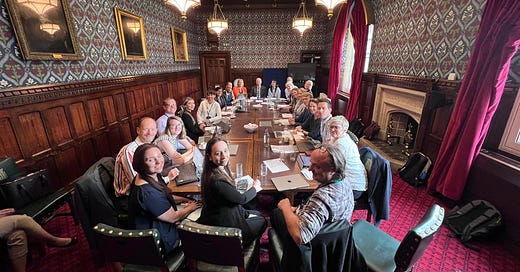AI-Powered Higher Ed
What a House of Commons round table discussion tells us about how AI will impact the purpose of
This week, I attended a round table discussion at the House of Commons with politicians and experts from across the education sector to feed into UK policy on AI in Higher Education.
Unsurprisingly, one of the key areas of concern and discussion was the impact of AI on academic integrity: in a world where AI can write an essay, what does AI mean for what we assess and how we assess it? And how do we respond in the short term?
In this week’s blog post I’ll summarise the discussion and share what we agreed would be the most likely new model of assessment in HE in the post-AI world.
Let’s go! 🚀
AI & Assessment in Higher Ed
The rise of AI tools like ChatGPT in the academic community presents both challenges and opportunities.
While concerns about assessment and academic integrity are real, broadly speaking the initial reaction that we saw earlier this year to ban the use of AI in higher education and invest in AI detection technology is making way for a new and more optimistic discussion and exploration of how AI might augment, rather than threaten, assessment in higher education.
This discussion isn’t new; decades of research and discussion exist both on what we should assess in higher education (e.g. knowledge Vs skills) and how we assess it (e.g. essay Vs project).
What is new is the urgency of this topic. As is so often the case with AI in the education context, the technology hasn’t created a problem - it set fire to an existing problem.
AI: A New Era of Authentic Assessment?
‘Authentic assessment’ refers to the assessment of learning that is conducted through ‘real world’ tasks requiring students to demonstrate their knowledge and skills in meaningful contexts’ (Swaffield, 2011).
Put simply, authentic assessments are designed to measure a learner’s ability to apply learning to real-world contexts. The benefits of this approach to assessment for learner engagement, learner achievement, wellbeing and employability are well reported (Sokhanvar, Salehi & Sokhanvar, 2021).
Here are four ways in which AI can be used to design and deliver more authentic assessment:
Scenario-Based Assessments: Use AI to create dynamic, real-world scenarios where students must apply their knowledge. For instance, in a business course, AI can generate case studies or simulate a market scenario where students must make decisions based on real-time data. Their decisions and the rationale behind them can then be assessed.
Collaborative AI Projects: Encourage students to work with AI tools to solve complex problems. For instance, in a programming course, students could be tasked with training a simple AI model. This not only tests their coding skills but also their understanding of AI principles and ability to make evidence-based decisions collaboratively.
Critical Analysis of AI: Instead of just using AI to generate answers, students could be tasked with critically analysing outputs from AI tools. For instance, they could be given a piece of text generated by ChatGPT and asked to identify potential biases, inaccuracies, or areas for improvement. This not only tests their domain knowledge but also their understanding of the strengths and weaknesses of AI.
Open-Book / Open-Internet Exams: In the real world, we often have access to tools and resources. Instead of traditional closed-book exams, we might allow students to use the internet and AI tools but design questions that can't simply be answered by ChatGPT or similar tools. This tests their ability to discern, analyze, and apply information in time constrained conditions using AI.
AI: A New Crossroads for Higher Education
While AI tools like ChatGPT pose challenges to traditional assessment methods, they also offer an opportunity to rethink both what we assess and how we assess our students in our universities.
By embracing AI and integrating it into the assessment process, educators can create more authentic, real-world relevant assessments which better prepare students for the workforce.
But this in turn raises a bigger question: why do people go to university, and what is the role of higher education in the twenty first century? Is it to create the workforce of the future? Or an institution for developing deep and original domain expertise? Can and should it be both?
One thing is for sure: in order to survive, HE will need to change more rapidly and deeply than ever before. Whether it decides to focus more on employability and “real-world readiness” or retreat back to its ivory towers and return to more academic roots is TBC.
Happy experimenting!
Phil 👋
PS: Want to get hands on and experiment with AI in your classroom, supported by me? Apply for a place on an upcoming cohort of my AI-Powered Learning Science Bootcamp here.






